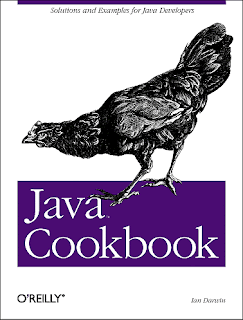Feb 2, 2012
O'Relly - Java Extreme Programming Cookbook
O'Relly - Java Extreme Programming Cookbook
English | ISBN: 0-596-00387-0 | PDF | 288 Pages | 1.23 MB
This book consists of 11 chapters, as follows:
Chapter 1
This chapter provides a quick overview of each tool covered in this book. It also explains how
the tool selection relates to XP.
Chapter 2
This chapter explains many key concepts of XP.
Chapter 3
This chapter is a beginner's overview to Ant, a portable Java alternative to make utilities.
Chapter 4
This chapter provides in-depth coverage of JUnit, the most popular testing framework
available for Java.
Chapter 5
This chapter shows how to use HttpUnit for testing web applications.
Chapter 6
This chapter explains techniques for using mock objects for advanced testing.
Chapter 7
This chapter describes how to test servlets, filters, and JSPs running in a servlet container.
This is the only tool in this book devoted to in-container testing (tests that execute in a
running server).
Chapter 8
This chapter shows how to use JUnitPerf, a simple and effective tool for writing performance
tests around existing JUnit tests. This chapter also discusses how to use JUnitPerfDoclet,
which is a custom XDoclet code generator created specifically for this book.
Chapter 9
This chapter shows how to use the XDoclet code generator. In addition to showing how to
generate EJB code, we show how to create a custom code generator from the ground up. This
code generator is used to generate JUnitPerf tests and is aptly name JUnitPerfDoclet.
Chapter 10
This chapter shows how to incorporate Tomcat and JBoss into an XP build environment.
Tomcat is the official reference implementation of the servlet specification and JBoss is
arguably the most popular open source EJB container.
Chapter 11
This chapter introduces additional open source tools that are gaining popularity but were not
quite ready for their own chapters.
Download Link:
Mediafire
English | ISBN: 0-596-00387-0 | PDF | 288 Pages | 1.23 MB
This book consists of 11 chapters, as follows:
Chapter 1
This chapter provides a quick overview of each tool covered in this book. It also explains how
the tool selection relates to XP.
Chapter 2
This chapter explains many key concepts of XP.
Chapter 3
This chapter is a beginner's overview to Ant, a portable Java alternative to make utilities.
Chapter 4
This chapter provides in-depth coverage of JUnit, the most popular testing framework
available for Java.
Chapter 5
This chapter shows how to use HttpUnit for testing web applications.
Chapter 6
This chapter explains techniques for using mock objects for advanced testing.
Chapter 7
This chapter describes how to test servlets, filters, and JSPs running in a servlet container.
This is the only tool in this book devoted to in-container testing (tests that execute in a
running server).
Chapter 8
This chapter shows how to use JUnitPerf, a simple and effective tool for writing performance
tests around existing JUnit tests. This chapter also discusses how to use JUnitPerfDoclet,
which is a custom XDoclet code generator created specifically for this book.
Chapter 9
This chapter shows how to use the XDoclet code generator. In addition to showing how to
generate EJB code, we show how to create a custom code generator from the ground up. This
code generator is used to generate JUnitPerf tests and is aptly name JUnitPerfDoclet.
Chapter 10
This chapter shows how to incorporate Tomcat and JBoss into an XP build environment.
Tomcat is the official reference implementation of the servlet specification and JBoss is
arguably the most popular open source EJB container.
Chapter 11
This chapter introduces additional open source tools that are gaining popularity but were not
quite ready for their own chapters.
Download Link:
Mediafire
Java EE 6 Development with NetBeans 7
Java EE 6 Development with NetBeans 7
English | ISBN 978-1-849512-70-1 | True PDF | 392 Pages | 16.2 MB
English | ISBN 978-1-849512-70-1 | True PDF | 392 Pages | 16.2 MB
Subscribe to:
Comments (Atom)























